
|

One person at a time
Building Peace in the Middle East
by Alexandra Hopkins
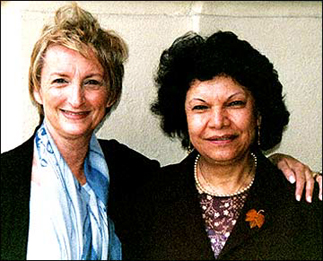 |
|
|
|
Joan Lonstein (above), founder
of the Association for Peace and Understanding in the Middle East (APUME), has
joined forces with Zeinab Habash (also above) of the Palestinian Ministry of Education,
and like-minded Israeli and Arab humanitarians, to make The Way to Happiness available
in Israeli newspapers (1), in shopping hubs (2), on the streets
(3), at university campuses (4) and in the markets (5).
|
Joan Lonstein, a Los Angeles criminal reform specialist, thought she
had seen her share of turmoil and strife dealing with criminals within the corrections
system. But in October 2000, while in Israel on her annual visit to her son and
two grandchildren, she found herself in a real war zone as the Israeli/Palestinian
situation suddenly ignited with a deadly new round of conflict.
Peace talks that for almost a decade had contained the explosive scene, simply
collapsed. The Palestinian Intifada, or uprising, meant a new and escalating
rash of suicide bombings and violent Israeli retaliation. An all-out conflagration
seemed at hand — pessimists and the media were warning that this one could devastate
the Middle East, disrupt oil-dependent economies and might even turn nuclear should
Israel exercise her widely believed nuclear capability.
So Joan’s return to LA did not include the normal adjustment back to the workaday world. Instead she hit the ground running, immediately meeting with friends and co-workers at the Association for Better Living and Education (ABLE) International, a nonprofit public benefit organization dedicated to social betterment.
“It's time we started a campaign,” she told those gathered there — people from across the spectrum of Middle Eastern concerns — Jewish-Americans, Israeli-Americans and Palestinian-Americans. Joan wasted no time in alerting them to what she saw and, more pressingly, what she felt was about to happen in Israel.
ABLE officials, briefed on her plans, encouraged her to take the broadest possible actions to bring greater understanding and peace to the people of Israel.
And one friend, Israeli-American Hagit Raviv, picked up instantly on Joan's call and, within days, the two had launched an initiative to defuse a situation 8,000 miles away. Their campaign revolves around the one-on-one, Middle-Easterner-to-Middle-Easterner distribution of The Way to Happiness booklet, the small, but potent common-sense moral code written by L. Ron Hubbard two decades prior.
Both had seen the calm it brought to other world hot-spots. A decade earlier, for instance, with tensions growing by the day as South Africa prepared for the elections that would finally lay apartheid to rest, violence's fuse was measured in micrometers. But concerned South Africans coolly distributed 800,000 copies of The Way to Happiness booklet. The elections, in which Nelson Mandela became the country's first black President, proceeded peacefully without the riots, or even chaos, that many had feared.
|
• •
• • • • • • • • • •
• • • • • • • • • •
|
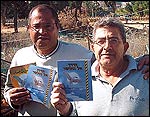 How
can a little booklet calm the raging sea? How
can a little booklet calm the raging sea?
"...Keep that booklet
flowing in the society. Like gentle oil spread upon the raging sea, the calm will
flow outward and outward."
— L. Ron Hubbard, 1981
From the thousands of responses,
it is clear that Palestinians and Israelis have the answers in The Way to Happiness.
Here is a recent sampling...
"It made me honest
with myself and others. It also taught me how to deal with others."
-- Rania, a Palestinian.
"Through this booklet, we will learn
to love, to give respect, to really live, to protect the environment and to do
good things for personal integrity."
-- Zehava, an Israeli.
"I will use all
the booklet, particularly Chapter 20 ...I have to learn to treat others in the
same manner I would like them to treat me...kindly, generously and in a noble
way...every person can be capable of a new beginning."
— Neama of Gush Etzion,
Israel
"With The Way
to Happiness, there is still hope of bringing happiness to communities. I was
very happy when I read the book... We needed a book like this a long time ago."
-- Palestinian police
academy commander (and distributor of 2,000 booklets to his cadets).
|
|
• •
• • • • • • • • • •
• • • • • • • • • •
|
A Campaign is Launched Overnight
Hoping to bring understanding and tolerance to the Middle East, one person
at a time, Joan and Hagit, with the support of ABLE International, began planning
a campaign similar to the one that had been successful in South Africa. But they
faced one formidable obstacle: distance. The Middle East was halfway around the
world. But at the same time, they learned, a business consultant in Israel, Danny
Vidislavski, was already taking the key action that would make Joan and Hagit's
campaign possible.
Vidislavski describes the times from his perspective: “When the Palestinian uprising started, I was at a barbecue with friends. Someone called me to tell me what was happening. I immediately had the thought, ‘This is war; we should do something about it.’
“Right then, I decided that we needed to distribute 20,000 The Way to Happiness booklets to Arabs living in Israel — not in the Palestinian areas, as we couldn't travel there. But there are many Arabs living in Israel too. At 6 p.m. that evening, I started calling people from my address book asking for money. I got some friends to help. Our batteries ran down on our cell phones and other guys came with battery chargers. We kept calling through the night and by 2 or 3 a.m. we had 19,000 shekels ($4,000), just from regular people. Most people charged it on credit cards.
“Soon we reached Joan and Hagit in America. With their help and with the help of many supporters in Israel, we raised the rest of the funds for that first printing.
“There was a problem though: We had no Arabic translation of the booklet. I found out that a translation had been started in Italy. We got a hold of the translation and then contacted a Bedouin who lives in a tent. Astonishingly, he had no electric lights but he had a laptop. He finished the translation for us in a few days. We found an Israeli who could print in Arabic. Within a week of the start of the Intifada, we had printed 20,000 copies of The Way to Happiness booklet.
“But we didn't know how to distribute them. I didn't know any Arabs, just the ones I saw on TV. We started asking around and eventually we made some contacts. An Arab DJ got a copy of the booklet and read it on the radio. He read one chapter a day for 21 days. Within a few weeks, we distributed all 20,000 booklets.
“In contrast to the Israeli Arabs, the Palestinian Arabs — those outside Israel — turned to violence,” he noted.
|

|



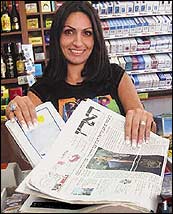
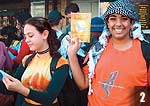
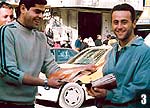
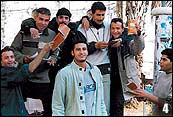
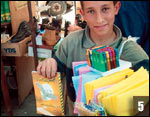
 How
can a little booklet calm the raging sea?
How
can a little booklet calm the raging sea?